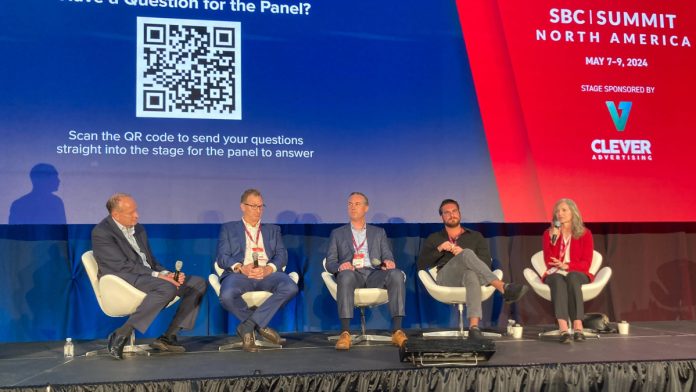In a U.S. gaming industry in which FanDuel and DraftKings share a dominant lead of the market share and everyone else is playing for third, how can so-called second movers find their place in a saturated field?
That was the topic of the SBC Leaders Panel at the SBC Summit North America 2024 in New Jersey. Executives from various renowned and well-established gaming and betting companies assessed the lay of the land of the U.S. market today and what companies need to do to keep moving forward.
Market share isn’t everything in U.S. gaming
The conversation began with a look at the successes of the two biggest players.
“FanDuel and DraftKings had the significant head start of having the digital wallet share of customers when PASPA was repealed in 2018,” said Joey Levy, CEO and co-founder of Betr. “They had nearly a decade of brand awareness investment, collectively millions of customers acquired through daily fantasy sports businesses, and we’ve since learned they had anywhere from 60 to 80% cross-sell rates from fantasy to sports betting. Is it good for the industry? I think the answer is no.”
Offering a valuable perspective was Eric Hession, CEO of Caesars Digital, another company with a significant albeit smaller piece of the pie.
“When we set our market share objectives, we think we’re going to be at around 10%,” Hession explained. “We can have a great business at a 10% market share. We think the focus on market share is a little misguided. If you look at 2023, you have two of the three most profitable companies sitting here and our combined market share probably doesn’t even equal the third-placed operator.”
Rush Street Interactive is another of those operators that hasn’t captured the level of market share that FanDuel and DraftKings have but nevertheless has a deep footprint in the market.
CEO Richard Schwartz, like Hession, is not too concerned with market share or even basic revenue growth. “Profitability is what matters most,” he told attendees. “It’s less about share of GGR and more about how we engage users, how we retain customers. It’s less about overall size and more about how profitable we will be in the long term.”
Don’t make misestimation mistake
For any existing or emerging regulated operators looking for a solid presence in the U.S. market, there are lessons to be learned.
While many brands have thrived in the States, others have come and gone in several jurisdictions. The likes of WynnBet and Levy’s Betr leaving Massachusetts this year are just some example of operators leaving markets whether by choice or by force. For sportsbooks and gaming companies that didn’t have a solid foundation or strong brand awareness before regulation, the road can be littered with obstacles.
Marina Bogard, managing director of North America for Swedish operator Betsson, noted that while there are multiple reasons for some operators’ lack of success in the U.S., one major factor is misestimating and misunderstanding the market.
“In Europe, players have grown up with betting, it’s on every street corner. The U.S. market is not that way, it hasn’t been that way outside of a couple of states until recently. So making an assumption that everyone understands how to bet and understands the process is one miscalculation. The onus is on you to grasp an understanding of the U.S. player and what their needs are.”
Joe Asher, president of sports betting at IGT, echoed Bogard’s sentiment, pointing to a lack of understanding of the nuances of America’s state-by-state market. He also acknowledged just how tough it can be for operators who know they have to spend significant amounts of money just to have a shot at competing.
“Wynn was taking a shot at it and then pulled out because they’re spending a lot of money,” Asher noted. “If you’re spending $100 or $200 million but others are spending five times that, it’s pretty hard to get resonance with customers.”
Those lessons don’t only extend to operators who have left markets but also some of the big-name players still operating across the country.
Hession frankly admitted to the attendees that Caesars Digital made the mistake of “vastly overpaying” for some of its partnerships in past years. “We’ve since been trying to reprice them in a more economical way. In that regard, the second mover is in a lot better shape than the first mover because prices were previously exceptionally high.”
Differentiate outside the box
So, as well as drawing lessons from the past, how can these second-mover companies successfully find a foothold?
The panelists were all in agreement that it’s critically important to differentiate in order to survive and stand out. That doesn’t only mean creating unique games and presenting them well to customers but also being bold and branching out.
“Those who know how to innovate and develop features that are unique and differentiated have a great opportunity,” added Schwartz. “Because, ultimately, players want to experience something that’s unique, different fun, exciting, something that’s not available anywhere else. There are ample things one can do beyond offering the same betting markets or the same game concepts as everyone else.”
Levy cited DraftKings’ recent acquisition of lottery app Jackpocket as a move that was “pretty interesting” in the gaming and betting space as it opened up an entire new channel for the sportsbook. DraftKings has already seen significant success cross-selling customers from its fantasy operations to sports betting and it will now have a chance to try to do something similar with lottery players and online casino.
But as well as the typical gaming channels, something particularly interesting is the notion of casting the net wider to include things such as social multimedia content. If the ultimate goal is customer retention, creating a virtual community that players want to be part of is important.
Key to that is marketing. A sportsbook may have competitive odds or a unique betting market but generating engagement is about more than advertising the products on offer.
“Instead of just putting out a bunch of paid marketing advertisements, think more creatively,” urged Levy. “Original short-form video content on social media that resonates doesn’t just bring awareness but brand affinity in a way that establishes a unique relationship between the consumer and the operator.”
Ultimately, the message is that unless an operator is really differentiating their product experience (and even if they are), it’s time to consider a more creative approach.
“Clearly, there’s room for people who are thinking differently to become significant in the industry,” concluded Asher. “I think there are going to be new entrants coming into this market and taking a significant share. It happens in other industries, so I don’t see why this industry would be different.”














